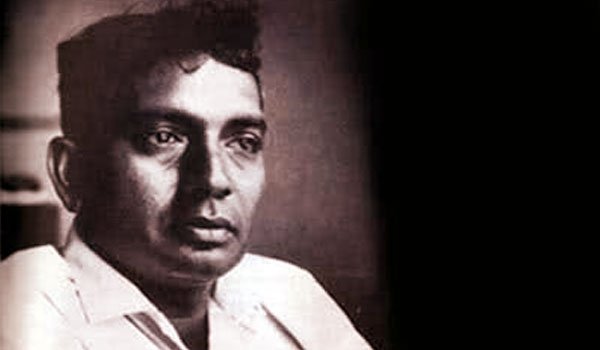The preface to this collection was a lecture delivered by Sekara on “Patriotism in Verse”. This Sekara lecture had this long excerpt on the Sinhala version of the “National Anthem”, with Sekara making his thoughts abundantly clear.
I picked this part from a facebook post and thought it would give those who debate over the holy right of singing the national anthem only in Sinhala, a different pedestal to stand on.
Sekara’s reading of the Sri Lanka National Anthem
When discussing “national pride” in film songs, we are compelled to refer to the “National Anthem”. I personally feel our national anthem has few flaws. What is evident when reading the lyrics of the national anthem is, Ananda Samarakoon’s creative ability had gradually eroded at the time of writing the national anthem. That is why these shortcomings are so evident. This song is not strong enough to create a heroic feeling and that of pride in us. What we hear in this national anthem is a “pleading”. It could also be the melody that makes it so. Also the repetitive phonetics. When there are too many such repetitions, any song sounds more like a lullaby. When we look at the words, this certainly is a pleading.
ශ්රී ලංකා මාතා... අප ශ්රී..... ලංකා
නමෝ නමෝ නමෝ නමෝ මාතා......
සුන්දර සිරි බරිනි සුරැදි අති සෝබමාන ලංකා.....
ධාන්ය ධනය නෙක මල් පලතුරු පිරි
ජය භූමිය රම්යා
අප හට සැප සිරි සෙත සදනා.....
ජීවනයේ මාතා.....
පිළිගනු මැන අප භකිතී පූජා
නමෝ නමෝ මාතා.....
අප ශ්රී.... ලංකා
නමෝ නමෝ නමෝ නමෝ මාතා......
ඔබවේ අප විද්යා...... ඔබවේ අප සත්යා
ඔබවේ අප ශක්තී...... අප හද තුල භක්තී......
ඔබ අප ආලෝකේ...... අපගේ අනුප්රානේ
අප ජීවන වේ...... අප මුක්තිය ඔබවේ
නව ජීවන දෙමිනේ
නිතින අප පුබුදු කරන් මාතා....
ඥාන වීර්ය වඩවමින රැගෙන යනු මැන
ජය භූමි කරා....
එක මවකෙග දරු කැල බැවිනා
යමු යමු වී නොපමා.....
ප්රේම වඩා සැම භේද දුරැ ල ලා....
නමෝ නමෝ මාතා..... අප ශ්රී.... ලංකා
නමෝ නමෝ නමෝ නමෝ මාතා......
අප ශ්රී.... ලංකා....... නමෝ නමෝ නමෝ නමෝ මාතා...
In the first lines, the writer captures the scenic beauty, the grace of Ceylon. He says, Ceylon is a land of joyous wealth, abundantly rich in everything good on earth. In the next lines he addresses Ceylon as “Mother” and says, ‘you bring us plenty prosperity. You are our Knowledge and you are our Truth. You are our strength and our faith. What does this mean ? It means, Mother Lanka is complete with everything. It also means we have nothing. The line, “You are our strength” also means we have no strength, if not for you. Similarly the lines, “You are our sentient, our divine path” says we on our own have no freedom and a divine path. So, what does the writer wants Mother Lanka to do ? He wants Mother Lanka to give us new life and keep us enlightened always. We have no life, no energy, or we are lifeless. That may be why he wants Mother Lanka to give us new life. Why is he asking us to be always enlightened? Are we otherwise dumb? Why say give us wisdom and strength ? Is it we lack wisdom and strength ? The writer pleads with Mother Lanka to remedy our shortcomings, make us complete and to lead us to the land of victory. No one can lead a people like this to a land of victory. The other issue is, what this land of victory is. The writer started off by saying this is a land of victory. Then, we are here on the land of victory. Yet the writer is asking ‘Lanka’ to take us to the land of victory. Where is that second land of victory ? That is the next question.
In the last two lines, the writer completely forgets about Mother Lanka. He therefore tries to mobilise people in a different way by saying, “As children of a single mother, let’s march together”. This disorganised format of the song is one flaw. If Lanka was treated as a Mother in addressing her, then such should have been the approach all though out the song. The writer first worships Lanka, treating her as a Mother. Thereafter Lanka is no mother, but a land of victory. Yet again, Lanka becomes a mother. Thereafter he forgets he is addressing Mother Lanka. He thus turns towards the people to start another dialogue. He says, let’s forget differences and arguments, let’s march forward. It’s not necessary here to remind about differences and arguments. That gives attention to a weakness. Mere saying we should give up our differences and arguments, does not help remove them. If such differences and arguments were by then forgotten, this is a reminder. In the song, the two references on unity and giving up on differences does not bring about the same feeling.
The larger flaw in the song is its content and meaning. As I said earlier, this song is one that pleads for help. It means as a nation, we are a weak nation. The only hope we have is Mother Lanka. We therefore appeal to Mother Lanka to wipe out our weaknesses and march us to prosperity. This makes us accept our own defects. It is not possible to make us feel proud about us as a nation and feel a heroic nation.
In a song of national pride, we can mention about heroes in our past history. We can dwell on our rich cultural heritage. We can talk of gems, of tuskers and of our scenic natural beauty.
I honestly believe, the national anthem should say exactly the opposite of what is being said in it. The national anthem should pronounce our commitment, our strength in safeguarding our motherland even by sacrificing our lives. Not plead for her help.
Translation – Kusal Perera
(http://kusalperera.blogspot.com)






